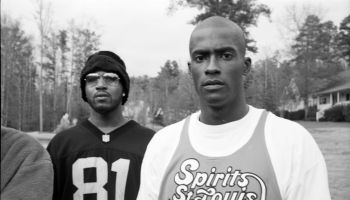Before the Rev. Johnny L. Jones earned the nickname “Hurricane” for whipping sermons into a frenzy, before he recorded a string of gospel LPs for Jewel Records, before his church in Atlanta’s West End burned in 1973, and long before his records started showing up again in thrift stores to be discovered and bought by a younger generation, Johnny Jones was just a young boy sitting at a tent revival in Marion, Ala. The year was 1949.
“I can’t think of the man’s name, but he played piano and sang,” Jones says. “I guess the audience went wild along with me and I sat back there watching him. At 13 my prayer was, ‘Lord, let me play a piano just like he’s playing it.'”
Later that day, Jones told his mother that he could learn to play the piano if she would buy one for him.
“She said, ‘John, you know we don’t have the money to buy a piano. We don’t know how well the crops are going to be this year. But if we can raise 21 bales of cotton, the 21st bale will go toward purchasing your piano.’ And the Lord blessed us to make 25 bales of cotton. So she bought me a piano and put it in the house. I basically taught myself how to play.”
Called to preach at the young age of 19, Jones preached at country revivals and around LaGrange before settling in as pastor at Second Mount Olive Baptist Church in Atlanta. At the small church on Maple Street in the late ’50s, Jones started recording the songs and sermon of each Sunday service on reel-to-reel tape. Jones says that Coretta Scott King and the Rev. Martin Luther King Jr. lived in the neighborhood at the time.
“Martin and I used to be young enough that we could sit on the hood of a car, cross our legs and talk. My Lord, if I had known he would grow into such a star, I would’ve had him making tapes back then.”
Jones started his recording career by putting out his own debut, an LP titled Working for God, financed with cash borrowed from his father. His third self-released LP, Jesus Is in Town, caught the ear of Stan Lewis at Jewel Records. The Louisiana-based record label – “the largest Gospel one-stop in the business,” according to Billboard magazine around that time – rereleased Jesus Is in Town in 1969 and continued releasing Jones’ records throughout the ’70s.
Jones earned such a reputation for building up his sermons from slow teaching into a frenzied power that a local radio DJ started calling him “The Hurricane.”
“The way that I break my voice, I do it as B.B. and Aretha and Muddy Waters, you know,” he says. “I always said that if Muddy Waters had been a preacher, he would have emptied a lot of churches with the way that he controlled that voice.”
Though Jones’ congregation quickly outgrew the Maple Street location and moved to a church on Westhaven Drive, a fire that broke out during service on Dec. 9, 1973, stopped Second Mount Olive Baptist from growing larger. Jones says that during the peak, Mount Olive was drawing 1,500 people on a regular Sunday, but the fire almost immediately diminished that to a few hundred congregants. “When you have a tragedy, sometimes people have a way of weaning off from you,” he says, a hint of bitterness detectable in his tone.
Jewel released Jones’ last album in 1978. In the years since, those records have gone out of print, eventually circulating into used bins and thrift stores where they’ve been picked up by younger listeners unfamiliar with Jones or his church.
Cole Alexander of the Black Lips remembers the time in 2003 when he first heard Jesus Is in Town. “Bradford [Cox] from Deerhunter made me a cassette tape of it. I think he found it in a Marietta thrift store. I used to listen to that tape at the Majestic [Diner]. I was working there as a dishwasher, and I would play it so loud that I could see people out front looking back in, wondering what the hell I was listening to.”
Years after he heard the tape, Alexander saw the sign for WYZE, a local AM gospel station, while driving down Boulevard and stopped on a whim. Remembering that the LP cover said that Jones was from Atlanta, he asked if anyone had ever heard of him. “Everybody there was really nice and told me that he comes in every Saturday to do a radio show.” Alexander, who continued stopping at the station to meet Jones and hear Jones’ reel-to-reel tapes, eventually put him in touch with Lance Ledbetter, founder of the Dust-to-Digital record label.
Since being introduced, Ledbetter and Jones have worked together, listening to the vast archive of recordings that Jones has never released. Together, they’ve culled those tapes into Jones’ first LP in 31 years, Jesus Christ from A to Z. The collected recordings are striking, loose documents of that Hurricane style: soaring organs, screaming congregants and Jones leading it all in his distinctive moan.
The Methodist theologian John Wesley once asked, “Why should the devil have all the good music?” Today, the Rev. Johnny L. Jones is proof that he doesn’t.














